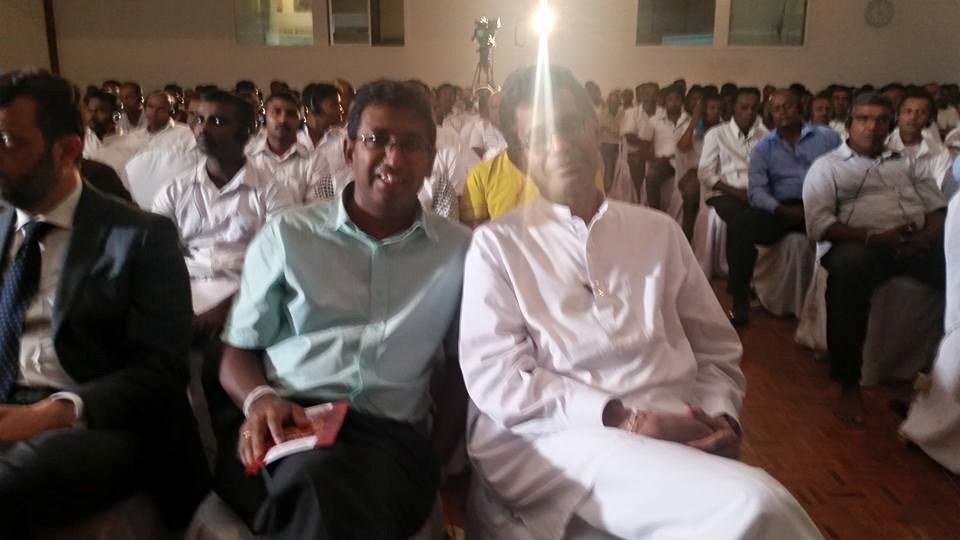Social Market Economy: Does It Provide A Solution For Sri Lanka?
By Sumanasiri Liyanage –
I think it is for the first time that the idea of social market economy is introduced into the Sri Lankan election discourse. Champika Ranawakaappears to have borrowed the concept of social market economy (SME) from Dr. Harsha de Silva and used it as it was his invention for the purpose of portraying the economic policy framework of the future UNFGG government for the next five years. As far as I know, the concept of social market economy has never been discussed in serious manner in Sri Lanka. In the early 1990s, a seminar was held at the Colombo Hilton in which a German professor had outlined the concept SME as it had been practiced in Germany especially in the post World War 2 period. What is social market economy? What are the main characteristics of the SME? How does it differ from Anglo-American notion of market economy? What the exact role the state plays in the SME? These are the sort of issues I intend to address in this article.
A brief history would not be out of order in contextualizing the concept of SME. Although the concept was theoretically advanced in the 1930s, one may even suggest that some of the features of SME were put into practice during the Bismarck regime in Germany in the late 19th century. Bismarck introduced a universal social insurance scheme in response to the increasing popularity and influence of the social democratic party in Germany. The following description by Wikipedia gives a fairly correct account of the SME as it was later advanced by Müller-Armack in the 1930s:
 “Social market economies aim to combine free initiative and social progress on the basis of a competitive economy. The social market economy is opposed to laissez-faire policies and to socialist economic systems and combines private enterprise with regulation and state intervention to establish fair competition, maintaining a balance between a high rate of economic growth, low inflation, low levels of unemployment, good working conditions, social welfare, and public services.”
“Social market economies aim to combine free initiative and social progress on the basis of a competitive economy. The social market economy is opposed to laissez-faire policies and to socialist economic systems and combines private enterprise with regulation and state intervention to establish fair competition, maintaining a balance between a high rate of economic growth, low inflation, low levels of unemployment, good working conditions, social welfare, and public services.”
Wikipedia further explains: “The social market economy refrains from attempts to plan and guide production, the workforce, or sales, but it does support planned efforts to influence the economy through the organic means of a comprehensive economic policy coupled with flexible adaptation to market studies. Effectively combining monetary, credit, trade, tax, customs, investment, and social policies, as well as other measures, this type of economic policy creates an economy that serves the welfare and needs of the entire population, thereby fulfilling its ultimate goal.”
Hence, we may note that it differs from Anglo-American laissez-faire policies that emphasize market as a equilibrating mechanism that would sooner or later generate social welfare as a by-product. Similarly, SME may be distinguished from social democracy and Soviet-type socialism, as it refuses to enter into the sphere of production as an agent of production. Müller-Armack conceived the social market economy as a regulatory policy idea aiming to combine free enterprise with a social program that is underpinned by market economic performance. Hence, it is a synthesis of seemingly conflicting objectives, namely economic freedom and social security.
The policies based on the SME were put into practice by the Cristian Democratic Union (CDU) government led by Chancellor Konrad Adenauer. West Germany was able to achieve a remarkable growth rate during the 1950s and 1960s when economy was steered by the Minister of Economics, Ludwig Erhard (if my memory is correct he later became the Chancellor). However, the amalgam of factors contributed for Germany to achieve high rate of growth. It received substantial impetus through US Marshall program. The victorious countries became magnanimous towards Germany following the advice given by J M Keynes. In Germany although the factors of production were destroyed relations, structures and culture of production remained basically intact. Under SME, social justice was achieved primarily through two processes, namely, (1) ensuring job security through government regulations making the termination of employment rather difficult; (2) using public money to finance housing, education and other social program. Therefore, the tax rate for highest bracket of individual income was kept at 95 percent. It applied only to income above the level of DM250,000 annually.
Of course, we may see, even Germany has been now moving away from SME because of the pressure from the process of globalization. In 2015, average tax rate in Germany exists between 44- 57 per cent. On the issue job security, although German situation is much better when compared with the USA, situation seems to be gradually changing. However, it is interesting to note that stronger job security in Germany has been accomplished by an unemployment insurance system that deters layoffs. On the other hand, In the U.S., the unemployment insurance system has encouraged layoffs while discouraging the use of work-sharing schemes.
German attitude towards SME may be seen clearly not in respect of its domestic economic policies but in respect to policies it has imposed on poor EU countries. Recently, Germany imposed heaviest neoliberal policy package on Greece. They Syriza, the left government in Greece, to reduce income tax rate and to cut down pensions, wages and social welfare expenditure.
So when the United National Front for Good Governance (UNFGG) promises that it will in power adopt SME policies, it seems that UNFGG is totally ignorant of the changing nature of capitalistic mode f production in the last 25 years or so. When capitalism moved from its late capitalist phase to neoliberalist phase, it means that capitalism has now moved away from high tax policies as well as security of employment policies.
The irony is when one read carefully UNFGG manifesto, it is in fact against SME for three reasons. First, it does not say anything about the job security and never offers an answer to growing phenomenon of manpower agencies that makes employment status undefined. What will it do in power to this issue? How is it going to tackle the issue of the growing casual and contract labor in relation to permanent employment in the private sector? The UNFGG manifesto as well UPFA are silent on this issues. This silence indicates that the both parties are planning to move to more flexible labor market.
Secondly, The UNFGG manifesto has proposed to take the EPF out of the Central Bank and gives it to so-called independent trust. What we have witnessed in the past 10 years is that many attempts were taken to rob the EPF, but fortunately all failed. EPF is the largest capital fund owned by the workers in Sri Lanka. Some time ago, Swedish economist, Meidner, suggested that moving towards socialism may be achieved by using this capital for social production and welfare. The UNFGG wants to rob the fund and give it to domestic and foreign capitalist class.
Thirdly, both manifestos promise many ‘goodies”. However, there are no acceptable and rational proposal as to how these goodies would be financed. In Sri Lanka, tax income is around 11 per cent. Is this tax revenue adequate to finance many programs included in manifestos?
SME and neoliberalism are gross incompatibilities. There is no way to link the first with the second. Those who propose that they would go for SME or social democratic policies today are either making a big mistake or trying to throw sands into the eyes of the Sri Lankan voters.

Comments
Post a Comment